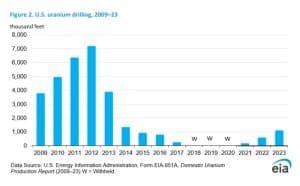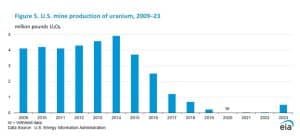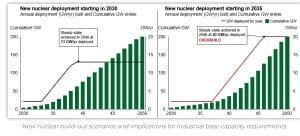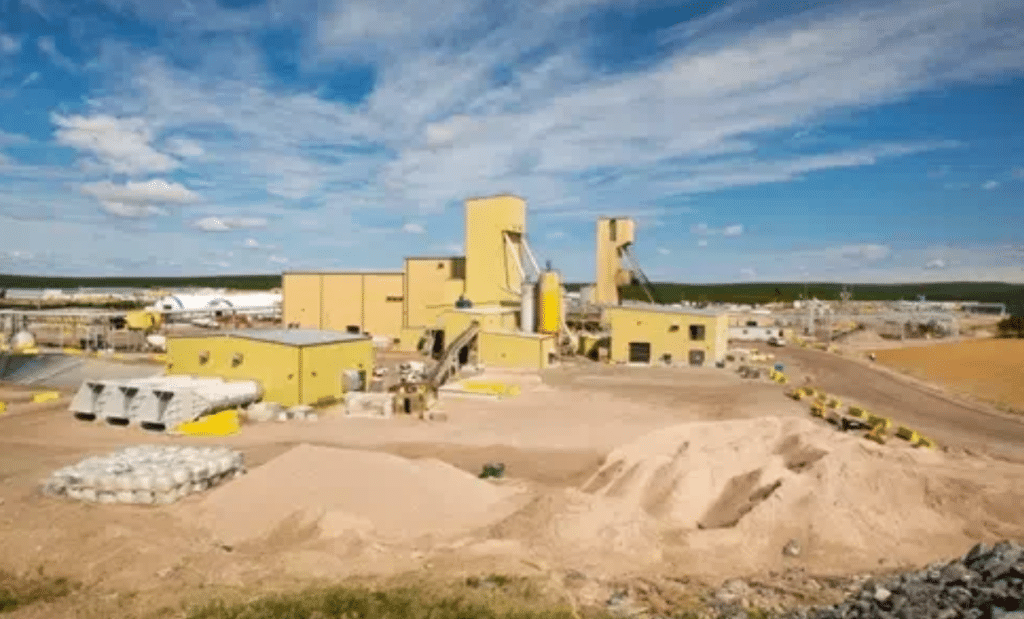The U.S. Department of Energy (DOE) has released a request for proposals (RFP) to buy low-enriched uranium (LEU) from U.S. sources. This move aims to boost domestic uranium enrichment capacity safely and responsibly. The RFP is backed by $2.7B from President Joe Biden’s Investing in America agenda, which was approved in May.
Breaking Free from Russian Influence in Nuclear Fuel with $2.72 Billion Injection
This year on May 13, President Biden signed a historic law, The Prohibiting Russian Uranium Imports Act to strengthen America’s energy and economic security. This law aims to reduce and eventually eliminate the country’s reliance on Russia for nuclear power.
It reestablished U.S. leadership in the nuclear sector, securing America’s energy future. With $2.72 billion in funding, it boosted new enrichment capacity in the U.S. and showed a commitment to long-term nuclear growth. This move would also promote a diverse market and ensure a reliable supply of commercial nuclear fuel.
Additionally, this law supported the country’s international goals. It banned imports of enriched uranium from Russia. Furthermore, last December, the U.S., Canada, France, Japan, and the UK pledged $4.2 billion to expand enrichment and conversion capacity.

US Energy Secretary Jennifer Granholm noted,
“DOE is helping jumpstart uranium enrichment capacity here in the United States, which is critical to strengthening our national security and growing our domestic nuclear industry,”
Ali Zaidi, National climate advisor and assistant to the president, highlighted the significance of transitioning from fossil fuel. He remarked,
“Under President Biden’s leadership, we have spurred an unprecedented expansion in clean energy production, which is creating good-paying union jobs and putting us on a path to greater energy security.”
Moving on, contracts from this initiative will last up to 10 years, with proposals due by August 26, 2024.
A MESSAGE FROM URANIUM ROYALY CORP.
[Disseminated on behalf of Uranium Royalty Corp.]
How To Get Ahead In The Nuclear Renaissance.
Uranium Royalty Corp. is a pure-play uranium royalty company focused on gaining exposure to uranium prices by making strategic investments in uranium interests, including royalties, streams, debt and equity investments in uranium companies, as well as through holdings of physical uranium.
Learn more about their portfolio of geographically diversified uranium interests >>
The Rise of Advanced Nuclear Reactors in the U.S.
These actions align with the DOE’s Pathways to Advanced Nuclear Commercial Liftoff report which wants to advance technologies for net-zero emissions by 2050. Additionally, the DOE’s Advanced Reactor Demonstration Program (ARDP) supports nuclear demonstration and risk reduction projects.
ARDP will accelerate advanced reactor demonstrations through cost-shared partnerships with U.S. industry. The Office of Clean Energy Demonstrations officially stated,
“It supports design, licensing, construction, and operation of two advanced reactor technologies, the TerraPower Natrium and the X-energy Xe-100 reactors. This funding builds on the initial $160 million from DOE’s Office of Nuclear Energy, awarded in 2020.”
These innovative nuclear technologies are designed to offer flexible electricity output and provide process heat for various industrial applications, including desalination and hydrogen production.
Advanced nuclear reactors can power homes and businesses sustainably. They have almost zero GHG, can efficiently use fuel, and are safe. The innovative designs can significantly increase the safety and performance of the existing reactors. Advancing these latest nuclear technologies will expand access to clean energy and open new market opportunities. It will also help preserve essential infrastructure and maintain vital supply chain capabilities.

- FURTHER READING: Paladin Energy Offers C$1.14 B to Canada’s Fission Uranium. What does it mean for Uranium Mining?
Biden’s $500M Investment to Transform Nuclear Energy
From a report published by DOE, we discovered that President Biden’s Inflation Reduction Act allocates up to $500 million for high-assay low-enriched uranium (HALEU)—an important material needed to develop and deploy advanced reactors. Simply put, this contract allows uranium conversion into usable fuel forms for advanced reactors. HALEU enhances reactor performance with longer-life cores and better fuel utilization.
Nuclear power is America’s largest clean energy source and this step will enable meeting emissions targets and the US’s pledge to triple global nuclear power by 2050. DOE is expanding the HALEU supply chain for advanced reactors, including recycling spent fuel from government research reactors. Current U.S. reactors use uranium fuel enriched up to 5% with uranium-235. However, most advanced reactors need HALEU, enriched between 5% to 20%, to achieve smaller, versatile designs with high safety and efficiency.
According to DOE, U.S. domestic nuclear capacity has the potential to scale from ~100 GW in 2023 to ~300 GW by 2050—driven by the deployment of advanced nuclear technologies.
Image: New nuclear build-out scenarios and implications for industrial base capacity requirements.

- READ MORE: The Atomic Awakening: Fueled by Uranium


